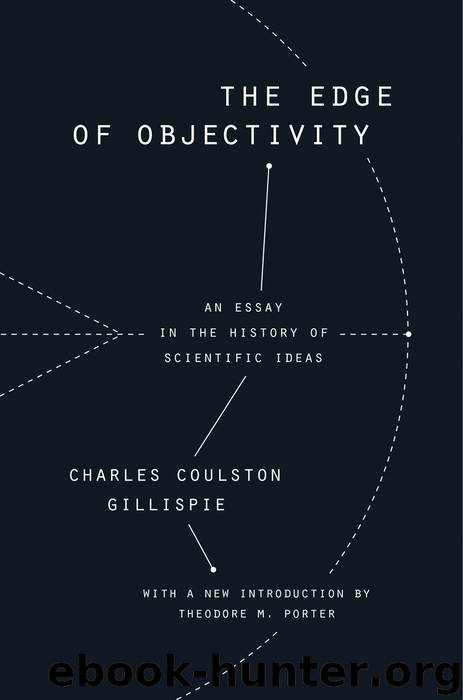The Edge of Objectivity by Gillispie Charles Coulston; Porter Theodore M.;

Author:Gillispie, Charles Coulston; Porter, Theodore M.;
Language: eng
Format: epub
Publisher: Princeton University Press
Published: 2016-02-28T16:00:00+00:00
IN THE CLOSING PASSAGE of his Discourse on the Revolutions of the Surface of the Globe, Cuvier reproached geologists with paying too little attention to these more recent events:
But how fine it would be to possess the chronological order of the organic productions of nature, even as we know that of the principal mineral substances. Organic science itself would profit. The developments of life, the succession of its forms, the precise determination of which had first appeared, the simultaneous birth of certain species, their gradual destruction—all this might probably teach us as much about the essence of the organism as all the experiments that we could try on living species. And mankind, to whom has been allotted only an instant on the earth, would have the glory of recreating the history of the thousands of centuries which preceded his existence, and the thousands of beings which have not been his contemporaries.
Geology is the subject which introduced a historical dimension into science: its own history, indeed, scarcely goes back beyond the nineteenth century. Even then, doubts were sometimes expressed about whether it could properly be a science at all. The geologist, like the historian, had to rely largely on interpreting relics of change. He could neither experiment nor quantify. Nor in the early stages might he even test the predictive value of his generalizations, as Cuvier, for example, could do. His conclusions were bound to remain matters of opinion in a way that those of the physicist, or even the anatomist, did not. And indeed, the science of geology represents a coming together of lore from the ancient practice of mineralogy with speculations about the origin of the earth, seventeenth-and eighteenth-century cosmogonies which have in them more of science fiction than of science. No doubt the historical bent taken by scholarship in the early nineteenth century stimulated a more sober approach to the question of how the world has come to be the place it is. But the essential technique for ordering the information about rock structures and topography into a science came from paleontology.
For lack of that, or any determinate technique, the controversies which attended the birth of the science were violent, immature, and inconclusive. The prevailing school at the turn of the century followed Abraham Gottlob Werner, professor of mineralogy in the ancient and famous mining school at Freiberg-im-Sachsen. He was one of those superb teachers whose magnetism turns students into disciples, and who is led by the necessity to lecture down the primrose path of systematization and organization by headings. It was the belief of the Wernerian or “Neptunist” school that all the rocks had been precipitated from primeval seas which had covered all the earth: chemically at first, when the slates and granites crystallized out; then mechanically, as the waters lowered and chalks and limestones settled; finally by silting as great torrents came and went and laid bare the mountains and the continents. Volcanic action occurred late and incidentally, activated by ignition of coal deposits, twisting the strata here and there out of the horizontal.
Download
This site does not store any files on its server. We only index and link to content provided by other sites. Please contact the content providers to delete copyright contents if any and email us, we'll remove relevant links or contents immediately.
Enlightenment Now: The Case for Reason, Science, Humanism, and Progress by Steven Pinker(6869)
A Journey Through Charms and Defence Against the Dark Arts (Harry Potter: A Journey Through…) by Pottermore Publishing(4721)
The Immortal Life of Henrietta Lacks by Rebecca Skloot(4248)
A Journey Through Divination and Astronomy by Publishing Pottermore(4248)
Elon Musk by Ashlee Vance(3852)
Origin Story: A Big History of Everything by David Christian(3471)
COSMOS by Carl Sagan(3346)
Alchemy and Alchemists by C. J. S. Thompson(3292)
Enlightenment Now by Steven Pinker(3271)
Shadow of Night by Deborah Harkness(3169)
Inferior by Angela Saini(3147)
A Mind For Numbers: How to Excel at Math and Science (Even If You Flunked Algebra) by Barbara Oakley(3102)
Bad Pharma by Ben Goldacre(3091)
Origin Story by David Christian(2990)
Signature in the Cell: DNA and the Evidence for Intelligent Design by Stephen C. Meyer(2875)
The Code Book by Simon Singh(2854)
The Elements by Theodore Gray(2851)
A Brief History of Time by Stephen Hawking(2819)
A Journey Through Potions and Herbology (A Journey Through…) by Pottermore Publishing(2770)
